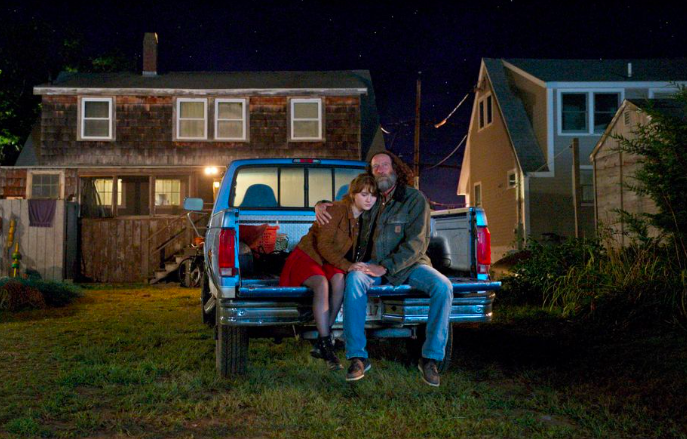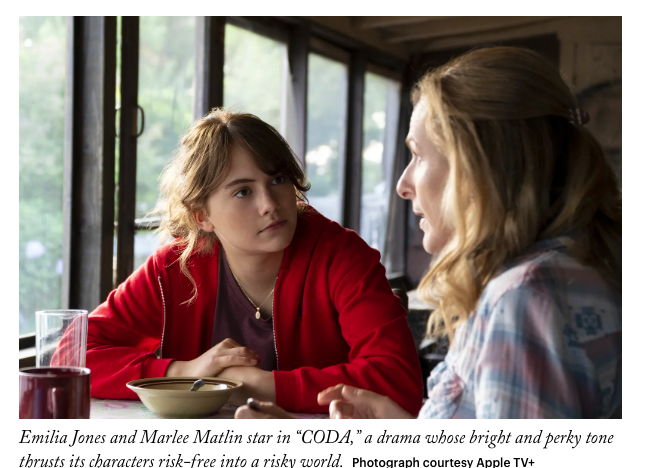CODA and La Famille Bélier — A great remake of a French ‘Feel Good’ film — Part 2
Part 1 can be found here – read it before Part 2
CODA follows the same general plot line as La Famille Bélier. The movie makes it clear that Ruby’s family is very dependent on her, and that she works long hours at sea before going to school. Exhausted, she dozes off on her desk during her history class, just as Paula had fallen asleep during her Spanish class.
Her parents’ occupation and the fact that they are deaf make her the butt of her classmates’ jokes. Frank and Jackie also have a very active sex life – and the doctor scene from La Famille Bélier is replicated in CODA. But this time, it is the loud sex that they have while Miles is rehearsing their duet with Ruby that leads her to be publicly embarrassed in the school cafeteria on the following day because Miles had mentioned this ‘funny’ incident to a friend, who had then leaked it to her own girlfriends.
Later in the movie, a TV crew comes to interview Frank and Jackie because they are starting a fishing cooperative, and Ruby, who has to be their interpreter, ends up being late for her singing lesson, and her music teacher refuses to let her into his house.

The said music teacher, Mr. V, played by Eugenio Derbez, just like his counterpart in La Famille Bélier, is unhappy to be stuck in a high school setting. To assess the voice range of his students, he makes them sing Happy Birthday – The Star-Spangled Banner might have been a bit of a challenge for them! His selection of songs for the school choir are Motown and 1970s staples. You’re All I Need To Get By, originally performed by Marvin Gaye and Tammi Terrell, is the duet that Ruby performs with Miles at the school recital.
Her audition song for the Berklee College of Music is Joni Mitchell’s Both Sides Now – a song whose lyrics are quite touching and suggest that love involves some give and take, but it is not quite as relatable to the storyline as Michel Sardou’s Je Vole.
The only reference to any American singer ever made in the movie is about Bob Dylan, whose voice Mr. V states is like “sand and glue,” before adding that “there are pretty voices that have nothing to say.”
Leo, Ruby’s brother in CODA, is a young adult, whereas Quentin, Paula’s brother, was a sex-crazed teenager. Yes, Leo does have sex with Ruby’s friend Gertie in the restroom of the bar where she works, and she becomes his girlfriend. But he is a mature young man who is much more involved in his parents’ fishing business than Quentin was in his parents’ dairy farm.
In fact, he is the one who is eager to open his family to the community at large. It is obvious that the family finances are suffering from the fees that they must pay to the licensing authorities and are cheated by intermediaries who purchase and sell their daily catch.
Leo comes up with the idea of starting a fishing cooperative with other local fishermen – who had earlier ridiculed him, an incident that had led to a bar brawl. He also wants Ruby to pursue her singing career, regardless of how much the family depends on her – even after their father gets fined because they were at sea without a hearing person on board, and could not hear the siren of the Coast Guards, who had been alerted of this fact by an inspector who was on their fishing boat.

CODA adds a wonderful scene – one with no exact equivalent in La Famille Bélier – between Ruby and her mother, in which Jackie tells her daughter how nonplused she was when she realized that she could hear and that she was always afraid that she would be a bad mother to her. This scene opens a window into the dilemma of deaf parents with CODA children.
The conclusions of both movies follow parallel lines: At the choir recital, Rodolphe and Gigi in La Famille Bélier, and Frank and Jackie in CODA, realize how mesmerized the audience is by their daughter’s performance. In both movies, the soundtrack becomes silent to let us experience the recital just as a deaf person would (some critics deemed this a “cheap” device.)
And Frank also asks Ruby to sing her song for him and, as Rodolphe had done in La Famille Bélier, he puts his hand on her throat to “experience” it. This leads the family to drive to Boston on the following morning so that Ruby can audition at Berklee, and Mr. V arrives at the nick of time to accompany her on the piano. Ruby also begins signing her song lyrics for her parents who are in the theater.
It is obvious that she made it into Berklee; this time, it is not the music teacher, but her girlfriend Gertie who drives her to Boston, and – just as in La Famille Bélier, she gets out of the car to give a final hug to her family, and her father tells her “go.”
One final difference between La Famille Bélier and CODA is how the relationship between Miles and Ruby develops. In the French film, there is a bit of romantic tension between Paula and Gabriel, but nothing really comes of it. We can infer, from one of the photos shown as the credits are rolling that they have become a couple after Paula’s move to Paris.
In CODA, after Miles apologizes to Ruby and tells her that he envies her for having such loving parents, they spend time at a pond surrounded by the high cliffs of a quarry, where they bond by jumping into the water – before finally kissing. This kind of scene is a romantic cliché (sexual tension in a pool setting) for which we can probably forgive Sian Heder.
Which is a better film; La Famille Bélier or CODA?
In its conclusion, CODA also makes it clear that Ruby’s family has now fully connected to, and has been accepted by the fishing community. The fishing cooperative is a success, Jackie is now carousing with the other ladies while packing fish, and Frank and Leo are having a great time at the local bar with the other fishermen. In this respect, CODA contributes better to open a dialogue between the deaf community and the hearing world, by making us realize that deaf people are like everybody else – except that they cannot hear – and can and should be included in all aspects of human life.
My final assessment is that, although I loved La Famille Bélier very much, I must admit that CODA handles the very same theme in what I would deem a more mature and successful way than the original French movie on which it is based. As such, it deserved to win the Academy Award for best picture, as did Troy Kotsur deserve the Oscar for best supporting actor.
Have you seen these films? What was your opinion? Please share in the comments.
Image credits:
1. AppleTV via Goldderby
2. Apple Tv via Refinery 29







Enjoyed your article on the films CODA and La Famille Bélier. My wife and I loved CODA, especially for its setting on the New England coast where we have a second home. But we had not heard of the original French-Belgian film until you pointed it out. Many thanks. Looks like they both received fame and money but at least CODA was able to cast deaf actors (and a non-actor). It’s a very good film. Many English-version adaptations fall short of their original foreign-language films, but not CODA.
I just watched CODA and I searched the Internet to see why no one pointed out the similarities with a German film I saw decades ago, Jenseits der Stille (Beyond Silence). https://www.imdb.com/title/tt0116692/.
That film has so many similarities with CODA and La Famille Bélier that it seems unlikely to be a coincidence. The way CODA began with the sea and Beyond Silence with ice skating seemed similar. Was Beyond Silence mentioned when La Famille Bélier was released?